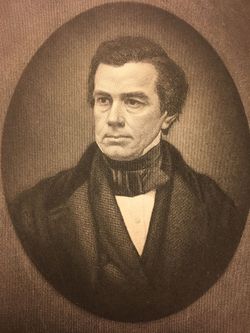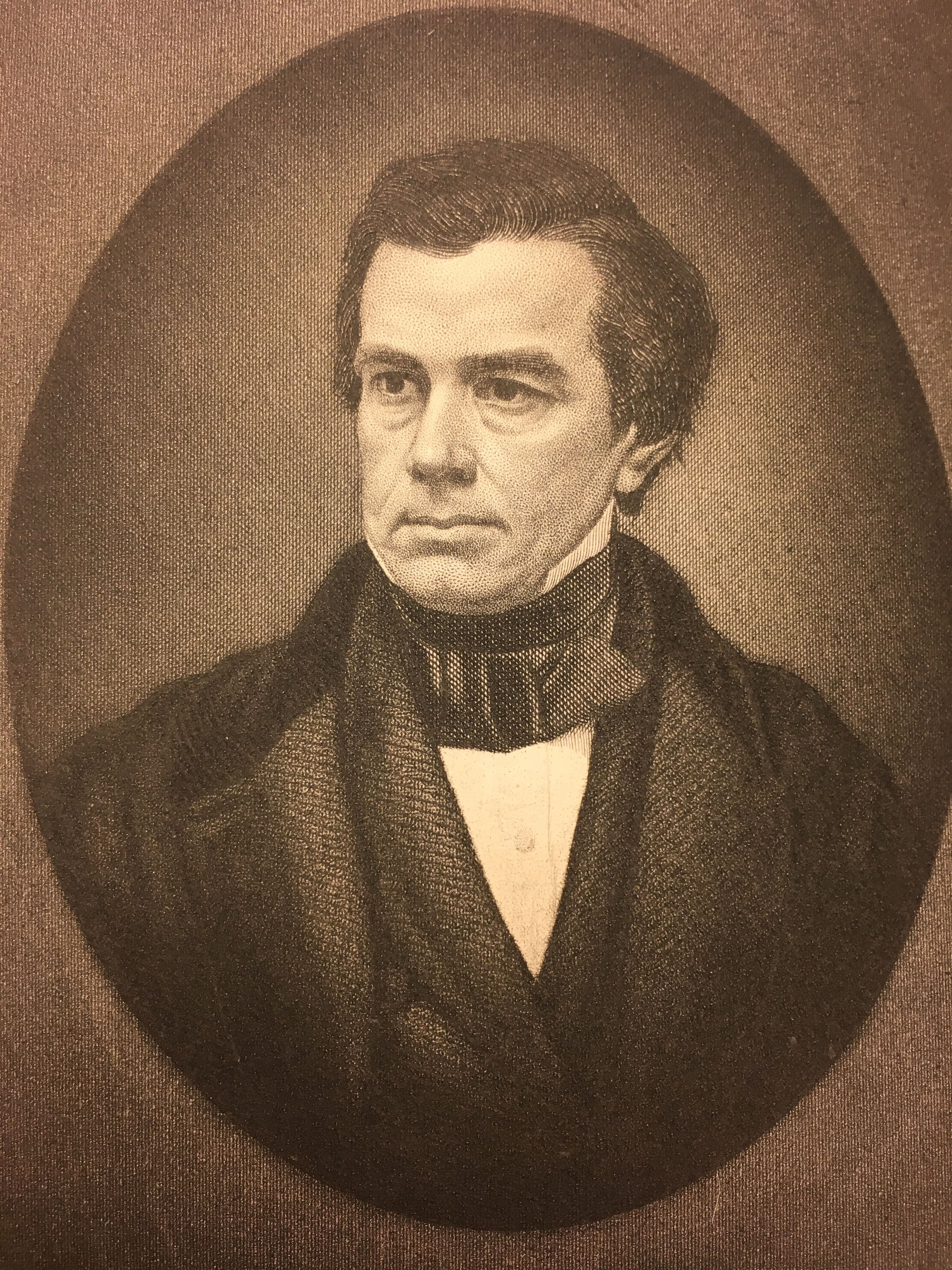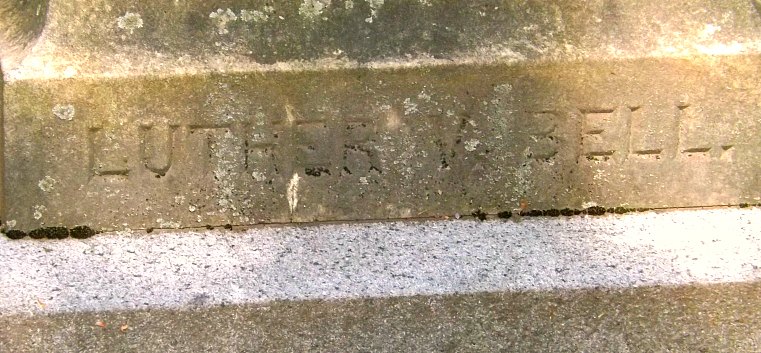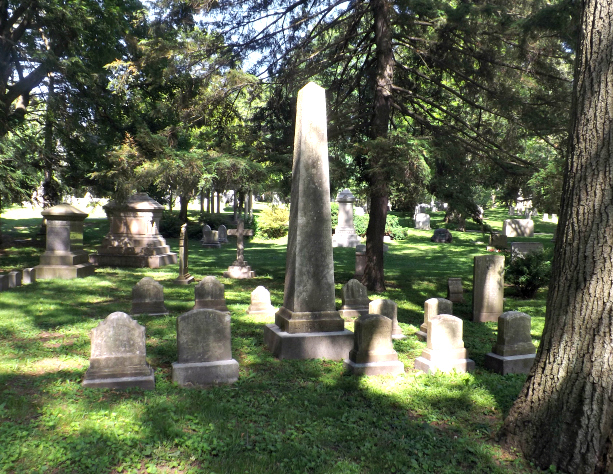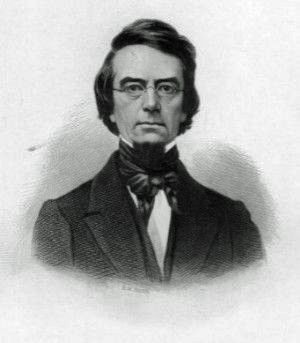11th Regiment, Massachusetts Infantry
******
interred 2/17/1862
******
Bell, Dr. Luther V. (1806-1862) Born Francestown, New Hampshire, son of state governor and two-term Senator Samuel Bell. Entered Bowdoin College age 12, graduated 1823. Moved to New York. Studied medicine with older brother John. Medical degree Dartmouth 1826. Superintendent of McLean Asylum, the first mental hospital in Massachussetts during “Joe” Andrews stay there. Surgeon U.S.Army, Civil War, Eleventh Regiment of Massachusetts Volunteers. During his tenure at McLean, three of Bells seven children died and his wife died in childbirth.
*******
Luther V. Bell
Wikipedia
Luther V. Bell, M.D. (1806-February 11, 1862) was one of the thirteen mental hospital superintendents who met in Philadelphia in 1844 to organize the Association of Medical Superintendents of American Institutions for the Insane (AMSAII), now the American Psychiatric Association, and the first medical specialty society in the United States. He was also Superintendent of the McLean Asylum (Hospital) near Boston, from 1837 to 1855.
Early life
Bell was born in Francestown, New Hampshire, son of state governor and two-term U.S. Senator Samuel Bell.[1] Bell’s early education was private. He entered Bowdoin College at age 12, and graduated in 1823. He moved to New York to study medicine under his older brother, John, and later received a medical degree from Dartmouth in 1826. Because of his youth, he worked in New York in business until 1831, when he returned to Derry, New Hampshire, to establish his medical practice.
Physician
In the 1830s, Bell submitted essays for the Boyleston Prize offered by Harvard Medical School. In 1835, he won the prize with an essay on diet, and in 1836, he was one of three winners for his submission, “How Far are the Means of Exploring the Condition of the Internal Organs to be Considered Useful and Important in the Practice of Medicine?” In addition to his medical practice, he carried on the family tradition of serving in politics and public office. He was elected in New Hampshire as a state representative and served on the legislative committee to investigate the status of the insane in New Hampshire. He lobbied vigorously for a state institution. He succeeded when the state legislature authorized its construction in Concord in 1838, and it opened in 1842. He stayed politically active: campaigning for a seat in Massachusetts in 1852 and for governor in 1856, both were unsuccessful.
Dr. Bell’s efforts for a state mental institution in New Hampshire became known to the Trustees of McLean Asylum after the death of the then superintendent. In 1836, Bell went to Boston to meet several trustees, and the Board offered him the position. He accepted and began traveling to other asylums. He visited asylums in Worcester, Massachusetts, the Hartford Retreat in Connecticut, and the Bloomingdale Asylum in New York. He assumed office at the McLean Asylum in February 1836.
The McLean Asylum was the first mental hospital in Massachusetts and was established in 1818 as an affiliate of the Massachusetts General Hospital under Dr. Rufus Wyman (1818-1835). Wyman established a treatment program known as “Moral Treatment,” which had been instituted by the Quakers in England. Bell continued this treatment method. The establishment of the Worcester asylum under state auspices in 1833 diverted indigent patients from McLean, which allowed the staff there to treat more affluent patients and to provide patients with comforts including occupation and recreation. As the superintendent at McLean, Bell was interested in hospital ventilation, and in 1848 presented the annual address to the Massachusetts Medical Society on this subject.
With the advent of the U.S. Civil War, Bell applied for a commission as a surgeon in the U.S. Army and was assigned to the Eleventh Regiment of Massachusetts Volunteers. He took part in the Battle of Bull Run in Virginia. He advanced to the post of Division Surgeon in the Eleventh Regiment under General Joseph Hooker. He became ill in February 1862 and died.
Dr. Isaac Ray, one of the thirteen founders of the AMSAII, published “A Discourse on the Life and Character of Dr. Luther V. Bell,” which he read at the annual meeting in 1862. The meeting adopted a Resolution expressing its sympathy of Dr. Bell’s passing.
******
Luther V. Bell
United States Civil War Soldiers Index
Name: Luther V. Bell
Event Type: Military Service
Military Beginning Rank: Surgeon
Military Final Rank: Surgeon
Military Side: Union
State or Military Term: Massachusetts
Military Unit: 11th Regiment, Massachusetts Infantry
Military Company: F&S
Affiliate Film Number: 3
11th Regiment, Massachusetts Infantry
******
interred 2/17/1862
******
Bell, Dr. Luther V. (1806-1862) Born Francestown, New Hampshire, son of state governor and two-term Senator Samuel Bell. Entered Bowdoin College age 12, graduated 1823. Moved to New York. Studied medicine with older brother John. Medical degree Dartmouth 1826. Superintendent of McLean Asylum, the first mental hospital in Massachussetts during “Joe” Andrews stay there. Surgeon U.S.Army, Civil War, Eleventh Regiment of Massachusetts Volunteers. During his tenure at McLean, three of Bells seven children died and his wife died in childbirth.
*******
Luther V. Bell
Wikipedia
Luther V. Bell, M.D. (1806-February 11, 1862) was one of the thirteen mental hospital superintendents who met in Philadelphia in 1844 to organize the Association of Medical Superintendents of American Institutions for the Insane (AMSAII), now the American Psychiatric Association, and the first medical specialty society in the United States. He was also Superintendent of the McLean Asylum (Hospital) near Boston, from 1837 to 1855.
Early life
Bell was born in Francestown, New Hampshire, son of state governor and two-term U.S. Senator Samuel Bell.[1] Bell’s early education was private. He entered Bowdoin College at age 12, and graduated in 1823. He moved to New York to study medicine under his older brother, John, and later received a medical degree from Dartmouth in 1826. Because of his youth, he worked in New York in business until 1831, when he returned to Derry, New Hampshire, to establish his medical practice.
Physician
In the 1830s, Bell submitted essays for the Boyleston Prize offered by Harvard Medical School. In 1835, he won the prize with an essay on diet, and in 1836, he was one of three winners for his submission, “How Far are the Means of Exploring the Condition of the Internal Organs to be Considered Useful and Important in the Practice of Medicine?” In addition to his medical practice, he carried on the family tradition of serving in politics and public office. He was elected in New Hampshire as a state representative and served on the legislative committee to investigate the status of the insane in New Hampshire. He lobbied vigorously for a state institution. He succeeded when the state legislature authorized its construction in Concord in 1838, and it opened in 1842. He stayed politically active: campaigning for a seat in Massachusetts in 1852 and for governor in 1856, both were unsuccessful.
Dr. Bell’s efforts for a state mental institution in New Hampshire became known to the Trustees of McLean Asylum after the death of the then superintendent. In 1836, Bell went to Boston to meet several trustees, and the Board offered him the position. He accepted and began traveling to other asylums. He visited asylums in Worcester, Massachusetts, the Hartford Retreat in Connecticut, and the Bloomingdale Asylum in New York. He assumed office at the McLean Asylum in February 1836.
The McLean Asylum was the first mental hospital in Massachusetts and was established in 1818 as an affiliate of the Massachusetts General Hospital under Dr. Rufus Wyman (1818-1835). Wyman established a treatment program known as “Moral Treatment,” which had been instituted by the Quakers in England. Bell continued this treatment method. The establishment of the Worcester asylum under state auspices in 1833 diverted indigent patients from McLean, which allowed the staff there to treat more affluent patients and to provide patients with comforts including occupation and recreation. As the superintendent at McLean, Bell was interested in hospital ventilation, and in 1848 presented the annual address to the Massachusetts Medical Society on this subject.
With the advent of the U.S. Civil War, Bell applied for a commission as a surgeon in the U.S. Army and was assigned to the Eleventh Regiment of Massachusetts Volunteers. He took part in the Battle of Bull Run in Virginia. He advanced to the post of Division Surgeon in the Eleventh Regiment under General Joseph Hooker. He became ill in February 1862 and died.
Dr. Isaac Ray, one of the thirteen founders of the AMSAII, published “A Discourse on the Life and Character of Dr. Luther V. Bell,” which he read at the annual meeting in 1862. The meeting adopted a Resolution expressing its sympathy of Dr. Bell’s passing.
******
Luther V. Bell
United States Civil War Soldiers Index
Name: Luther V. Bell
Event Type: Military Service
Military Beginning Rank: Surgeon
Military Final Rank: Surgeon
Military Side: Union
State or Military Term: Massachusetts
Military Unit: 11th Regiment, Massachusetts Infantry
Military Company: F&S
Affiliate Film Number: 3
Family Members
Advertisement
Explore more
Sponsored by Ancestry
Advertisement
